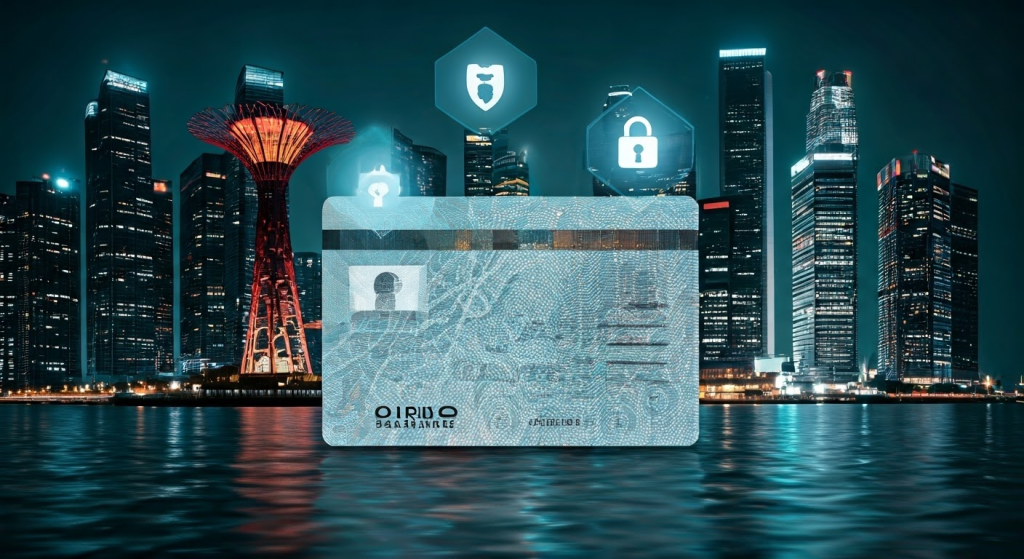
Key Highlights
- The Personal Data Protection Act (PDPA) in Singapore lays out strict guidelines for collecting, using, and disclosing National Registration Identification Card (NRIC) numbers.
- Businesses must obtain clear consent before collecting NRIC data and can only use it for purposes stated during consent.
- The PDPA emphasizes the importance of data protection, requiring businesses to implement stringent security measures for safeguarding NRIC information.
- In case of a data breach involving NRIC data, businesses face heavy penalties, including hefty fines and potential legal repercussions.
- Businesses must stay updated on PDPA amendments and guidelines from the Personal Data Protection Commission (PDPC) to maintain compliance.
- Organizations are encouraged to explore and implement alternatives to collecting full NRIC numbers, like using partial NRIC numbers or other forms of identification.
Other Tool : NRIC Generator | NRIC Validator | Bulk NRIC Generator | Bulk NRIC Validator | NRIC Barcode Generator
Introduction
The Singapore Government puts a top priority on protecting personal data. This is shown in the Personal Data Protection Act (PDPA), which establishes a strong framework for providing a standard of protection for personal data. This law was created in 2012 and focuses on being clear and responsible. The Act provides clear rules for organizations that handle personal data, including NRIC numbers, which are very sensitive.
Understanding PDPA and NRIC Data Collection
The Personal Data Protection Act (PDPA) in Singapore is important for protecting personal information, like NRIC numbers. These numbers are unique and contain a lot of personal data. The Act requires all types of organizations to follow strict rules for the protection of personal data when handling this sensitive information. The Personal Data Protection Commission (PDPC) makes sure that the PDPA is followed and helps businesses comply.
When businesses collect NRIC numbers, they must get clear consent from the individuals. They need to explain why the data is being collected. It is important for businesses to be open about how they will use the data and to protect it from unauthorized access, use, or sharing. The PDPC looks into complaints and can give penalties for not following the rules, which shows how serious data protection is in Singapore.
The Importance of PDPA in Safeguarding Personal Data
The Personal Data Protection Act (PDPA) is very important for protecting personal data in our digital world, including when individuals use data for personal purposes. As we rely more on data, this Act helps prevent misuse and unauthorized access to our information. The PDPA highlights that consent is key. Organizations must get clear and informed permission from people before they collect, use, or share personal data.
The PDPA also holds organizations accountable. They must put strong security measures in place to keep personal data safe from breaches and unauthorized access, including the establishment of personal data protection policies. This can include things like data encryption, controlling who sees the data, and regular security checks.
By creating these safeguards, the PDPA builds trust between people and organizations. When people feel sure their data is being handled in a responsible and ethical way, they are more willing to use digital services and share their information. This ultimately helps create a more secure and trustworthy digital environment.
Defining Personal Data within the Context of NRIC
An NRIC number, which is one of the national identification numbers, is on a person’s National Registration Identification Card. This number is not just for identification. It helps access a lot of personal information. Because the NRIC number is sensitive, it gets extra protection under the PDPA. If someone accesses it without permission, the person can face identity theft, fraud, and other privacy problems.
The PDPA knows how sensitive this information is. It requires organizations to handle NRIC data very carefully. They must only collect and use it for clear and important reasons. They also must put strong security measures in place to protect the data.
Protecting NRIC data is not just a legal duty; it is also an ethical responsibility. Businesses that deal with this information should put the privacy of individuals first. They must make sure their data practices follow the rules of being open and responsible.
Legal Framework for NRIC Data under PDPA
Singapore’s PDPA sets strong rules for handling NRIC data since this information is sensitive. Organizations must make sure their data protection policies match the strict PDPA requirements. They need to have good reasons to collect, use, or share such data.
The Act also states that any handling of NRIC data must be necessary for a clear and rightful reason. Organizations should put in place security measures to protect this data and stop unauthorized access, sharing, or use. If they do not follow these rules, they may face checks from the PDPC and could receive serious penalties.
Specific Provisions Related to NRIC Data Collection
The Personal Data Protection Act makes clear rules about handling NRIC data, including the disclosure of the NRIC. Organizations cannot gather NRIC numbers unless the law allows it or it is needed for a real business need where the good outweighs the risks. This collection must be justified and match the goal. For example, healthcare providers may collect NRIC numbers to identify patients and manage medical records. This is important for giving good care.
Also, when allowed, organizations cannot keep NRIC data forever. They should only keep it as long as needed for the original reason. Once it is no longer needed, the data must be destroyed safely, following the PDPA’s rules on data disposal.
It is clear that the PDPA sets strict rules for collecting NRIC data because of its sensitive nature. Businesses need to understand these rules. They must make sure they collect, use, and keep NRIC numbers only when it is truly necessary and legally allowed.
Limitations and Permissions for Businesses under PDPA
In Singapore, businesses often need personal data, like contact information and email addresses, for their work. The PDPA sets rules for handling sensitive information, like NRIC numbers. It emphasizes that data collection must be minimal and match the needs of the business. This means businesses should only gather the data they truly need.
The PDPA does allow certain cases where businesses can collect NRIC details. For example, financial institutions may require full NRIC numbers to follow Know Your Customer (KYC) rules, which help prevent money laundering. Healthcare providers also need NRIC data to correctly identify patients and keep accurate medical records, which are important for giving the right care.
The PDPA aims to balance business needs with protecting individual privacy. Organizations should know these data protection requirements and where they are allowed to gather data. It’s important to follow the PDPA guidelines and show a commitment to data protection obligations.
Best Practices for NRIC Data Management
Responsible management of NRIC data goes beyond following the PDPA laws. It also includes using the best methods for protecting personal data. A strong data breach notification system is very important. It helps businesses respond quickly to reduce risks and inform affected people and the PDPC when a breach happens.
Regular training for staff on PDPA rules is necessary. This training should cover secure ways to handle and store data and improve data processing protocols. Open communication with customers about how their data is collected, stored, and used builds trust. It shows a strong commitment to ethical data management practices, which is vital for PDPA compliance.
Consent Obtaining Procedures for NRIC Data
Given how sensitive NRIC numbers are, asking for permission to collect them is not just a formality. It’s about showing real respect for personal data protection. Organizations should include this idea in their data protection policies. They should make sure that consent is informed, freely given, specific, and clear.
When taking NRIC data, organizations need to explain clearly why they are collecting this information. The person should understand why it is needed and how it will be used. The way to give consent should be simple, allowing individuals to take a clear action to show their agreement.
This approach is more than just following the rules. It shows a commitment to ethical data handling practices. This builds trust and showcases a real commitment to protecting sensitive information. When organizations focus on clear and fair consent procedures, they improve their data protection strategies. They also show their commitment to the core ideas of the PDPA.
Secure Storage and Destruction of NRIC Information
Protecting the privacy and safety of NRIC information needs strong security steps at all stages. It is crucial to store it safely to avoid a risk of significant impact. Organizations should put money into systems and processes that stop unauthorized access and keep this sensitive data private.
The PDPA highlights the need for reasonable security arrangements. These arrangements can include:
- Data Encryption: This means coding NRIC information so that anyone who is not authorized cannot read it.
- Access Controls: This allows limited access to data based on what role people have in the organization.
- Secure Disposal: This involves safe methods like shredding or erasing data to make sure no one can recover it when it is not needed anymore.
Organizations must follow secure ways to destroy data when NRIC information is no longer useful. This makes sure that sensitive data is completely wiped out, reducing the chance of unauthorized access or misuse. Businesses should think about the whole data cycle—from collecting and storing to finally disposing of it.
Impact of PDPA on Business Operations
The PDPA is important for businesses. It makes companies focus more on data protection measures in how they work and make decisions. Businesses must hire a Data Protection Officer. This person ensures the company follows PDPA rules and encourages a strong data security culture.
Taking these steps can help avoid issues like non-compliance, fines, and bad publicity. When companies prioritize data protection, it becomes part of their culture. This builds trust with stakeholders and shows a commitment to handling data ethically.
Changes in Business Processes to Comply with PDPA
Adapting to the data protection rules in the Personal Data Protection Act (PDPA) requires businesses to change how they collect, store, and use data with reasonable notice. This includes regular business contact information. The time of gathering and keeping information without clear consent is gone.
Changing to fit PDPA needs stricter rules and new steps. For example, businesses may have to change their data collection forms to add clear consent statements. They might also need to improve data security by using encryption or better access controls.
The PDPA pushes businesses to collect only the data they really need. Each piece of data must have a clear purpose. It is also important for businesses to communicate openly with customers about their data practices, including the mandatory data breach notification requirement. They must also set up quick and easy ways for customers to ask for data access or corrections. These changes are essential for any business in Singapore’s data-focused market.
The Role of Data Protection Officers in Ensuring Compliance
The Data Protection Officer (DPO) plays an important role as a primary point of contact in keeping a company compliant with the PDPA. The DPO helps create a strong data protection culture in the organization. They make sure that the way the company handles data follows PDPA rules.
The DPO’s duties include setting up and carrying out data protection plans, doing regular risk checks and data reviews, and creating clear rules for notifying any data breaches. They are also the main contact for the Personal Data Protection Commission (PDPC) and handle all communications and reports.
Businesses need to know that a DPO does more than just make sure they follow the rules. The DPO promotes data protection in the company. They help build a culture that values and protects personal information. They also keep updated on changes in regulations and work with all parts of the business to keep up with changing data protection needs.
Penalties and Consequences of Non-Compliance
Any violation of the PDPA can catch the attention of the PDPC. This can result in serious consequences for the organization at fault. Penalties can include warnings for less serious violations. However, for more severe cases, the financial penalties can go as high as S$1 million or 10% of the organization’s annual turnover in Singapore, depending on which amount is larger.
The effects of not following these rules go beyond just financial penalties. Companies can face serious damage to their reputation. This can destroy the trust they worked hard to build with their customers. A loss of consumer confidence can hurt a company’s earnings and long-term success. Following PDPA compliance is important not only to avoid legal troubles but also to show a commitment to handling data responsibly.
Case Studies of PDPA Violations in Singapore
The PDPC has shown it cares about following the rules of the Personal Data Protection Act. They take action against companies that do not meet their data protection duties. One clear example is when a company was given big financial penalties for a data breach. This breach happened because they did not have strong security measures. They failed to use multi-factor authentication and good data encryption, which allowed unauthorized access to customer data. This shows how vital it is to have strong security in place.
In another case, an organization was punished for collecting too much data. They gathered more personal information than needed for their purpose and could not prove why they kept it for so long, which violated the retention limitation obligation. This broke the rules of data minimization that the PDPC supports. This example reminds us that data collection should match its purpose and that we should limit how long we keep unnecessary data.
These situations show how active the PDPC is in applying the PDPA. They are important lessons for businesses. Organizations must learn from these past mistakes. They should follow the PDPC’s advisory guidelines, put the right safeguards in place, and regularly check their data handling processes. This way, they can avoid big financial penalties and damage to their reputation.
How Penalties are Determined and Enforced
The Personal Data Protection Act sets up guidelines for deciding penalties based on how serious a data breach is and its possible effects, including the unauthorised disclosure of personal data. The PDPC looks at various things, like how sensitive the personal data is, how many people are affected, the organization’s awareness of the breach, and what actions were taken to lessen the damage.
If an organization does not put in place reasonable security measures, this raises the security risk and the chances of unauthorized access. In this case, penalties may be tougher. On the other hand, if an organization shows a proactive way to handle data protection, quickly reports breaches, and works well with the PDPC during the investigation, this can lead to lighter penalties.
In the end, the PDPC wants to make sure that penalties match how serious the violation is, especially in cases where establishing and verifying an individual’s identity to a high degree of fidelity is required. If a breach could lead to serious impacts on individuals, like identity theft or financial loss, this is very important during the decision-making. This method keeps organizations responsible for their data protection efforts and encourages a culture of following the rules of the Personal Data Protection Act.
Conclusion
In conclusion, businesses in Singapore need to follow the PDPA rules to protect NRIC data. It’s important to know the laws, get consent in the right way, and handle or dispose of NRIC information safely. Following these rules not only keeps personal data safe but also builds trust with customers. Using the best practices and changing how you work to meet PDPA needs is key. By focusing on data protection, businesses can avoid fines and keep their reputation. Staying informed, staying compliant, and focusing on data privacy will help maintain trust and credibility in your work. If you need more help with NRIC data, check out our FAQs or ask for professional advice.
Frequently Asked Questions
Can businesses collect NRIC numbers for any purpose?
Businesses cannot collect NRIC numbers for any reason. The PDPA requirements are strict. Data collection is allowed only in certain situations. It must have legal reasons and clear permissions.
What are the alternatives to using NRIC numbers in business transactions?
Alternatives to using NRIC numbers can be using only the last 4 digits of the NRIC, different IDs, special customer IDs made by the business, or gathering less personal data. This could include business contact information, such as a mobile number.
How should businesses dispose of or anonymize NRIC data?
To dispose of or hide NRIC data, we must focus on protecting personal data. We can securely destroy it using methods like shredding or data wiping to make it impossible to restore. Another way is to use techniques like masking or pseudonymization to keep the data anonymous.
What are the responsibilities of businesses under PDPA for data breaches involving NRIC information?
In a data breach that affects NRIC information, groups must follow the Personal Data Protection Act. They must quickly inform the people affected and the PDPC. They should take quick action to limit the breach and meet their data protection obligations to reduce possible harm.
Are there any exemptions for certain businesses or industries under the PDPA regarding NRIC data?
The Personal Data Protection Act applies to everyone. However, there are some exceptions for businesses or industries when it comes to NRIC data. Public agencies must follow specific rules. Sometimes, exemptions are allowed for reasons related to national security or public interest.


